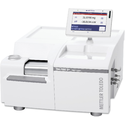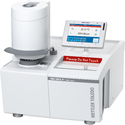Live Webinar: Sorption Analysis by Thermal Analysis
Determining the Influence of Water on Solid Materials by TGA-, TMA-, and DMA-Sorption
Programme
- Introduction to sorption and the effects of moisture content
- Different sorption analyzer systems and sorption measurements
- Relative humidity calibration
- Practical application examples (TGA, TMA, DMA)
- Interactive Q&A
The presence of moisture significantly influences material properties such as stability, shelf-life, and powder clumping. It can impact the effectiveness of drugs, affect the mechanical and physical properties of plastics, and cause microbial growth in foods. Understanding how different materials respond to moisture content is therefore critical, particularly for the food, polymer, and pharmaceutical sectors.
In our upcoming live webinar, we will explore sorption analysis using the thermal analysis techniques TGA, TMA, and DMA, providing you with valuable insights into how humidity and moisture impact material properties. Join us to enhance your knowledge and discover practical applications for your work!
The Advantages of Sorption Analysis by Thermal Analysis
Sorption analysis using TGA, TMA, or DMA offers significant advantages, including:
- Measuring material properties under precisely controlled relative humidity conditions
- Clear insights into how moisture impacts the substance of interest
- Determination of sorption enthalpies and calculation of key parameters such as isotherms, BET and GAB plots, and surface coverage behavior.
These insights help you to make informed decisions in applications ranging from product formulation to quality control.
Register for our upcoming live webinar to learn more about these benefits and explore practical applications. The webinar will conclude with a live Q&A session, so get your questions ready!
Expert

Nicolas Fedelich
With a background in chemical engineering, Nicolas joined METTLER TOLEDO in 2009 as an application specialist for Thermal Analysis. Before that, he gained expertise in different laboratories implementing, developing, and validating analytical methods in both the pharmaceutical and environmental fields. Nicolas also worked for three years in the field carrying out on-site customer training and providing expert thermal analysis application support. In his present position, Nicolas expertly uses, teaches, and supports DSC, TGA, TMA, and DMA instruments at the METTLER TOLEDO head office in Switzerland.



